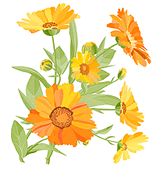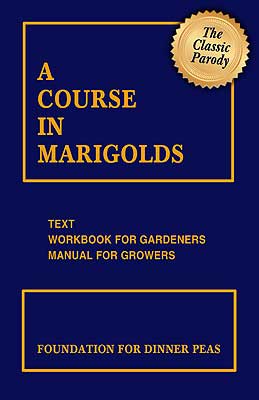ANNOUNCING THE ULTIMATE COMIC RELIEF
FOR STUDENTS OF 'A COURSE IN MIRACLES'....
IT'S BA-ACK!!
 "Gloria's gardening will never be the same!" "Gloria's gardening will never be the same!"— Endorsement of original 1988 edition by KENNETH WAPNICK, Ph.D. "I love your book, and have been spreading it around. Keep up the gardening!" — MARIANNE WILLIAMSON "I'm sure wherever it goes, this book will continue to plant seeds. He who has two good ears to hear, let him hear!" — GARY RENARD |

Mysteriously misplaced in a leaky garden shed since the turn of the century, A COURSE IN MARIGOLDS has returned to muddle the minds and lighten the hearts of students of A Course in Miracles everywhere.
This brilliant parody by Michael Stillwater echoes the unmistakable prose of the original ACIM to present an "ACIM for Gardeners" that is hard to describe and even more difficult to learn. A hilarious hybrid of horticulture and holiness, this ACIM begins where many other spiritual systems seem to wander off, and ends where no other system would even dare to begin...
"Nothing ventured, nothing gained,
nothing is left when nothing remains.
Herein lies the peace of gardeners."
____________________________
 Michael Stillwater innovates with music, words, and images. An award-winning songwriter, recording artist, photographer and filmmaker, he creates artistic reflections on societal issues and innovative avenues for contemplative expression. A Course in Marigolds arose spontaneously in the author’s mind after ten years with a music ministry based on A Course in Miracles. Best known for Graceful Passages and Shining Night, he resides in Switzerland with his wife and creative partner, Doris Laesser Stillwater, offering music and creative educational programs worldwide. For more about the author, visit www.innerharmony.com.
Michael Stillwater innovates with music, words, and images. An award-winning songwriter, recording artist, photographer and filmmaker, he creates artistic reflections on societal issues and innovative avenues for contemplative expression. A Course in Marigolds arose spontaneously in the author’s mind after ten years with a music ministry based on A Course in Miracles. Best known for Graceful Passages and Shining Night, he resides in Switzerland with his wife and creative partner, Doris Laesser Stillwater, offering music and creative educational programs worldwide. For more about the author, visit www.innerharmony.com.
______________________________________________

You are entitled to marigolds.
— 'ACIM' Workbook, Lesson 21
How It Came To Be
A COURSE IN MARIGOLDS began with the sudden decision of two people to join in an afternoon gardening project. Their names are unimportant. They were anything but gardeners. They had a history of trying to plant a garden, but continuously failing. The one who wrote down the material was the son of a Kansas farmer, and described himself:
“I always tried to grow plants — any kind at all — but never with any luck. They seemed to turn a cold shoulder to me. I had just about given up the idea of ever growing anything. And then something happened that triggered a chain of events I could never have predicted... my next-door neighbor unexpectedly announced that she wanted me to join her for an afternoon in her garden. As if on cue I agreed to help her out. Apparently this Course was to help me out.”...
What It Is
As its title implies, the Course is arranged throughout as a teaching device. It consists of three booklets: a Text, Workbook for Gardeners, and Manual for Growers. The curriculum is quite absurd, leading an innocent reader into a confused world of warring snails. Nonetheless, the fact that the work is channeled from the Other Side must be evidence enough that there is something important here, important enough to consider long and hard. There are many other courses, but this is the only one which will relieve you of the notion that you are a good gardener, and replace it with a strong suspicion that you might be better off in the funny farm. What possible use is such a course? What is the reason for its existence? Why did these inept gardeners go to the garden that fateful day? The answer to these, and many other questions, is what the Course in Marigolds is all about....
What It Says
“Nothing ventured, nothing gained,
nothing is left when nothing remains.
Herein lies the peace of gardeners.”
This is how A Course In Marigolds begins. It makes a fundamental distinction between the gardener you secretly thought you were, and the truth about your inability to garden. This applies to everything you would try to grow — there are no exceptions.
A Course In Marigolds is quite consistent in what it presents, with the seeming goal of leading an incompetent gardener into a state of psychological torment by mentally fabricating a war of epic proportions with the snails. Why it wants to do this is unclear....
Principles of Marigolds
There is no order of beauty in marigolds. One is not “prettier” or “more gorgeous” than another. They are all the same. All expressions of gardening are nice, and if sold, taxable.
Marigolds as such do not matter. The only thing that matters is their fertilizer, which is far beyond compost.
Marigolds occur naturally in the wild. The real marigold is always inspiring. In this sense everything that grows is inspiring.
All marigolds are alive, and watering helps. Your Guidebook will direct you very specifically. You will be told all you need to know.
Marigold growing is a habit, which should be involuntary. It should not be consciously planned out, or you may discover you should never have gotten into gardening in the first place.
Marigolds are natural. If they are dying, something has gone wrong....
Elevation and Marigolds
Elevation induces complete but temporary suspension of a sense of stability. It reflects the original form of vertigo, if you go up too high. This is why it is best to plant your garden close to the ground. Physical closeness to other gardeners is nice, but you cannot achieve optimum motion with your trowel and hoe if you are too close to someone else. Marigolds, however, are genuinely interpersonal, and their planting results in true closeness to others. Proper elevation unites you directly with the earth. Marigolds unite you directly with your brother, if he happens to be working on the garden with you. A consciousness of boredom is the state that induces you to garden, though it does not inspire it. You are free to believe what you choose, and what you do better be good....
“Awww” should be reserved for when you see little baby animals, to which it is perfectly and correctly applicable. It is not appropriate for marigolds because a state of “Awww” is sickeningly sweet, implying that you have forgotten you are gardening for a deep inner purpose. The marigold is therefore a sign of good gardening practice between equals. Equals should not be going “Awww” to one another’s flowers because “Awww” implies you are getting much too sentimental....
___________________________
WORKBOOK LESSON 5
“I am never upset by the snails — I think.”
This idea can be used in any situation where you find yourself today. Imagine you are in your garden, seeing hordes of snails chewing upon the very vegetables and flowers which you toiled for months to grow. Is this upsetting you? Or are you pretending it’s not upsetting, and pretending that what really upsets you is your job, your relationship, your finances, your aching back? Look more closely, and see if perhaps all these other “ailments” are merely disguising the real cause of your upset: the snails in your little garden.
When using the idea for today for a specific perceived cause of an upset in any form, use both the name of the form in which you see the upset, and the cause which you ascribe to it. For example:
“I am not angry at for the reason I think.”
“I am not afraid of for the reason I think.”
These statements reflect the newfound thought entering your consciousness — the question which emanates from deep within: Could the real cause of your upset, after all, be ... the snails?
It might help to precede the longer exercises with the statement:
“Snails may be small, but they sure upset me in a big way. They are all equally disturbing to my peace of mind.”
Then examine your mind for whatever is distressing you, regardless of how much or how little you think it is doing so. You may also find yourself less willing to apply today’s idea to some perceived sources of upset than to others. If this occurs, think first of this:
“I cannot keep this form of upset and let the others go. It’s either all the snails' fault, or else I’m just wasting my time with these funny exercises.”
Repeat this idea at least 340 times today....
_________________________
MANUAL FOR GROWERS
To garden is to demonstrate. There are many planting systems, and you demonstrate that you believe one or the other is best all the time. From your demonstration others learn, and so do you. The question is not whether you will garden, for in that there is no choice. By signing up for this course, you are committed for the rest of your natural life. The purpose of the course might be said to provide you with a means of choosing what you want to plant on the basis of what you want to prune. You cannot give what you cannot grow, and this you learn through gardening. Gardening is but a call to witnesses to attest to how well you’re doing at it. It is a method of gentle coercion. This is not done by words alone. Any situation must be to you a chance to talk about your latest bulbs and blossoms. No more than that, but also never less.
This is a manual for the gardeners of marigolds. They are not perfect, or they would not be taking this course. Yet it is their mission to become perfect here, and so they teach gardening over and over, in many, many ways, until they have learned it. And then they are seen no more, although their outstanding debts remain a source of consternation to all of their relatives. Who are they? How are they chosen? What on earth do they do? How can they work out their own special gardening style and teach others at the same time? This manual attempts to answer these questions, again and again, without any success....
THERE'S MUCH, MUCH MORE THAT
YOU DON'T KNOW ABOUT GARDENING...
ORDER THE COPY OF 'ACIM'
YOU WILL INEVITABLY HAVE, NOW!
____________________________________________




